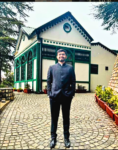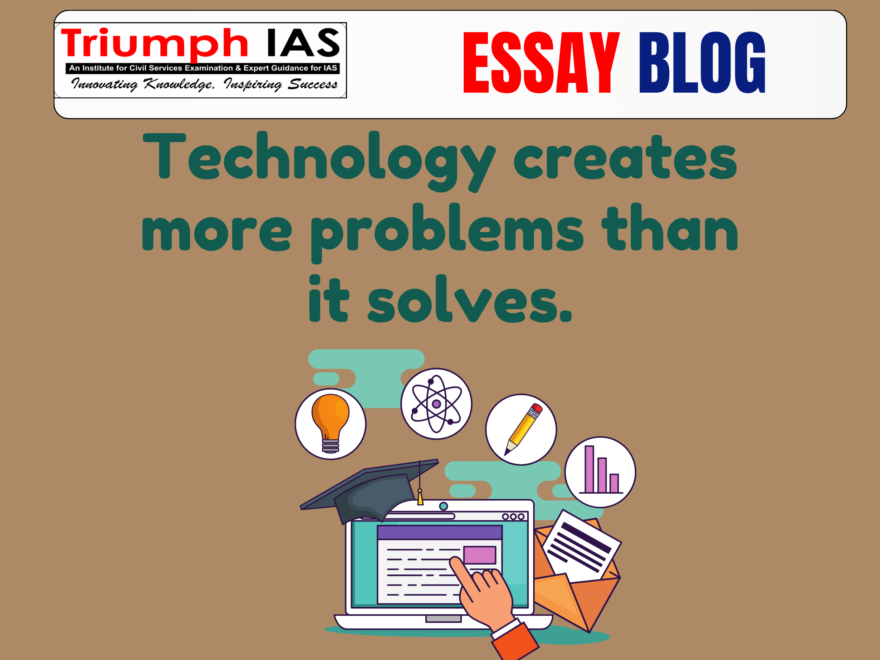IAS,PRAKHAR KUMAR SINGH

Essay topic:
Technology creates more problems than it solves.
(Relevant for Essay Writing for UPSC Civil Services Examination)
Technology creates more problems than it solves.Wearing a shabby white-colored dress, Rani is a 12-year-old student studying in a govt. primary school. With the advent of online education, especially amidst the COVID-19 pandemic, armed with a lack of internet and without a smartphone, she feels like a ‘baby thrown out of the bathwater’. Her father lost his job to the ‘automation’ drive of the company. The demand for jute products, which her mother used to sell, is already down since years with the advent of ‘better’ textile products. She and her family are the latest victims of technology where it has done more harm than good. Technology is applied science, i.e. when science is used in various socio-political and administrative affairs, it turns into technology. Hence, the science of today is the technology of tomorrow. Primarily, technology is meant to ease lives, improve efficiency and productivity of processes, and in contemporary society to enforce transparency and accountability. But as Thomas Piketty in his book ‘Capital in the 21st Century’ discusses, it has also led to increasing inequality. This essay will analyze both sides of the coin and discuss how it can be used in a welfarist perspective with a utilitarian approach. TECHNOLOGY: A DOUBLE-EDGED SWORD Similar was the case with guns and cannons, which helped forge large empires with stable life but at the cost of mass-scale bloodshed. At the end of the 17th CE, with the invention of the steam engine, the Industrial Revolution changed the course of technology. Mechanized processes with better efficiency gave greater choices to consumers at cheaper prices but at the cost of large-scale unemployment of ‘proletariat’ (Marx). With productivity levels highest ever and overflowing money in the ‘bourgeoisie’, it led to colonization, imperialism, and even increasing inequality, as Shashi Tharoor points out in his book, ‘An Era of Darkness’. Thus, even in the modern world of today, technology created more problems than it solved. Technology in the 21st century is leading to a crisis of identity and ideology. Yuval Noah Harari in ’21 Lessons for the 21st Century’ points out that ‘infotech’ and ‘biotech’ revolutions are endangering the only widespread ideology of today, i.e. democracy. Although technology has helped decrease vices of booth capturing & wrong votes, it has also exacerbated criminalization and hate speeches, which are instigating mob lynching and riots (Muzaffarnagar 2013). Election meddling by Russia in the USA (2016) and the Cambridge Analytica case are a manifestation of it. Technology in the economic sphere has improved productivity of processes and with (IR) Industrial Revolution 4.0 (WEF) in line, it is leading automatisation. But at what cost? Today unemployment levels are at an all-time high (CMIE: 9.1% in India) and inequality is scaring (Amartya Sen: Argumentative Indian). Technology is creating more problems than solving for crores of workers. With technology, newer mediums of communication have emerged in the form of social media. This has led to interconnectedness and a ‘globalised world’. Today distance is calculated not in miles but in hours and a person in the USA is a click away from their acquaintances. But all that glitters is not gold; cyberbullying, Blue whale challenge, and deepfakes are the genesis of the same technology which has destroyed many lives. The recent reports of WhatsApp groups being used for spreading Delhi Riots (2020) are a manifestation of technology creating more problems than solving. Technology has disrupted personal lives of individuals too. Today, sitting a thousand kilometers away, a person feels closer than ever with video calls every night. But this is only one side of the coin. Forwarding birthday wishes are only showing fake emotions; childhood is lost in video games; people posting about their ‘filtered’ world has increased narcissistic behavior among youth. Self-centeredness rather than common brotherhood is running high in veins of youth, thus leading to more problems than good. Even tribals, who are generally considered cut off from day-to-day world, have been impacted. Although with tribal haats and initiatives like ‘Going online As leaders’ (GOAL: Facebook), they are getting empowered but at the cost of increased exploitation of MNCs. A recent report by UNESCO, of 82 languages being endangered tells about the seriousness of problems which technology has brought rather than solving. TECHNOLOGY: HARBINGER OF PROSPERITY Oppenheimer, while inventing the Nuclear bomb, would not have thought that its use might save 1 million lives and reduce the duration of war by almost 2 years (BBC Report). In fact, today they are used as a deterrent for war. The role of technology has come to the forefront especially amidst the COVID-19 pandemic. People battling with depression are using telemedicine, students at home are learning online, and global leaders attending online conferences (G20, SAARC). It has led to increased collaboration amidst increasing uncertainty. TECHNOLOGY: TAME THE TIGER The government has taken steps to ease the lives by various e-Governance measures like ICEGATE portal (online custom clearance) PRAGATI, CPGAMS (grievance redressal), and others. The government needs to continuously innovate and upgrade in order to be one step ahead and allay the fears which Yuval Harari has raised. Technology needs to be used not to impress but impact. The solution also lies in value education of people using it as technology in itself is value neutral. Rather than turning a Nelson’s eye towards the problem, the need is to assimilate it who invented the revolver, repented after decades of inventing it. Technology is here to stay. |
To master these intricacies and fare well in the Sociology Optional Syllabus, aspiring sociologists might benefit from guidance by the Best Sociology Optional Teacher and participation in the Best Sociology Optional Coaching. These avenues provide comprehensive assistance, ensuring a solid understanding of sociology’s diverse methodologies and techniques
Meta Tags:
Water Resource Management,Water Resource Management,Water Resource Management,Water Resource Management,Water Resource Management,Water Resource Management,Water Resource Management, Water Resource Management,Water Resource Management,Water Resource Management,Water Resource Management

Why Vikash Ranjan’s foundation Classes for Essay?
Proper guidance and assistance are required to learn the skill of writing essay topics in CSE examination. VIKASH RANJAN SIR at TRIUMPH IAS guides students according to the Recent Trends of UPSC, making him the Best Essay Teacher for Essay writing UPSC.
At Triumph IAS, the Best Essay Writing Coaching platform, we not only provide the best study material and applied classes of Essay for IAS but also conduct regular assignments and class tests to assess candidates’ writing skills and understanding of the subject.
Choose The Best Essay Writing Teacher for IAS Preparation and Know our Approach for Essay?
- The Programme is Planned & Executed in a Way that You Write a good Essay for obtaining Effective Score of 140 Plus.
- In this programme we provide Classes on
- How to INTRODUCE The Topic in Context of the THEME of the Essay
- How to Elaborate & Explain the Topic-Theme on Temporal Scale & Sectoral Scale as well as Intellectual Scale in the MAIN BODY of the Essay.
- How to Sum up the Topic in CONCLUSION in Context of the Essay Topic Theme.
- ︎We will Teach You How to use the Knowledge Matrix of General Studies & Optional to write a Good Essay more Logically and Coherently.
- After the Classes You have to “Write to Learn & Learn to Score” .This means You have to Write the Essay Test Papers & Learn from the Feedback & Discussions.
Why Essay is Important and What We Offer in “Essay Test Series”?
- Triumph’s Essay Upgradation Test Series (Under Personal Guidance of Vikash Ranjan Sir) doesn’t only focus on improving student’s linguistic skills but also focus on improving student’s ability to comprehend the topic-sentence (subject) recall & relate the facts, concepts, propose thesis-statements, and logically assimilate the ideas & counter ideas with clarity in expression on temporal & Sectoral Scales of knowledge.
- Further students are provided one-on-one INTERACTION* Session with Vikash Ranjan Sir. Students get personal feedback on their strength and weaknesses, regarding what is ‘good about their essay and what more should be done to make it a better one’ by Vikash Ranjan Sir.
Why to take up this “Essay Test Series and Foundation” Course?
- Essay is Low hanging Fruit. Marks in Essay is Effectively Contributing in Final Selection in New Pattern of Mains Exam. With a Well Developed ‘Knowledge Matrix and Rigorous Practice’, One can Score upto 160 + in Essay. So IAS Aspirants should never Ignore Essay Preparation
- Inculcating Writing Competency in Essay for IAS, which is Different from Essay in English, Essay in School and College.
Follow us :
🔎 https://www.instagram.com/triumphias
🔎https://www.youtube.com/c/TriumphIAS
🔎https://t.me/VikashRanjanSociology
Find More Blogs…
| Compare and contrast Karl Marx’s and Max weber’s | Karl Marx- Historical Materialism |
| Position of Women In the Modern Indian Society | Sociology: Social system and pattern variables |
keyword: Technology creates more problems than it solves. Technology creates more problems than it solves. Technology creates more problems than it solves. Technology creates more problems than it solves. Technology creates more problems than it solves. Technology creates more problems than it solves. Technology creates more problems than it solves. Technology creates more problems than it solves. Technology creates more problems than it solves. Technology creates more problems than it solves. Technology creates more problems than it solves. Technology creates more problems than it solves. Technology creates more problems than it solves. Technology creates more problems than it solves.

